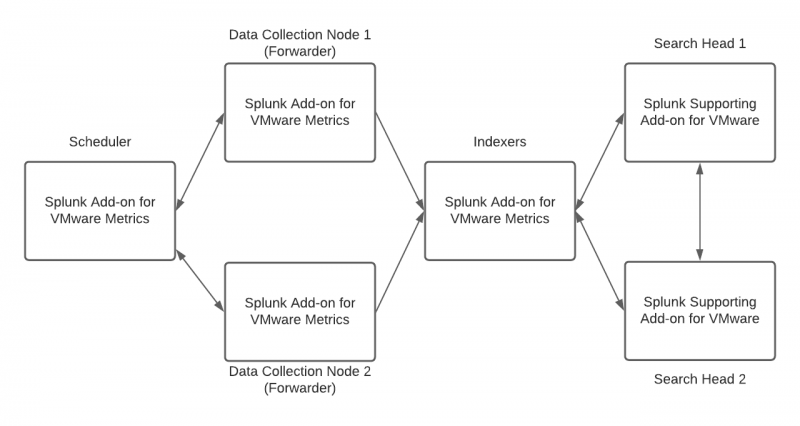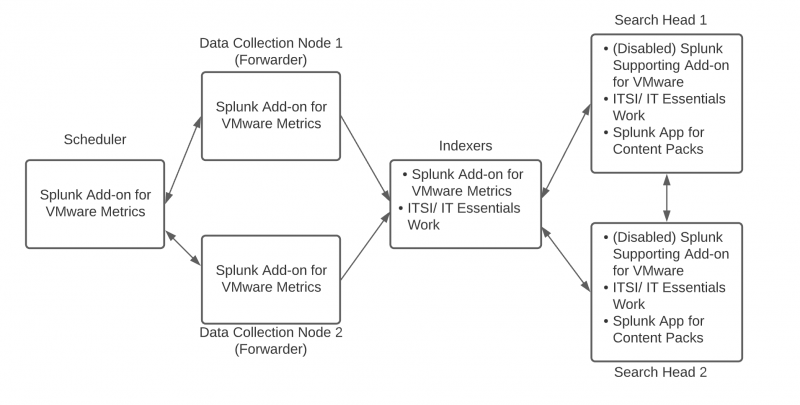Migrate from the Splunk Supporting Add-on for VMware or the Splunk App for VMware to the Content Pack for VMware Dashboards and Reports
The Content Pack for VMware Dashboards and Reports replicates the dashboards and reports available in the Splunk Supporting Add-on for VMware and the Splunk App for VMware. Migrate from these legacy apps to the content pack to take advantage of a consolidated experience within one app, either ITSI or IT Essentials Work. In addition, you can upgrade all content packs by upgrading the one app, the Splunk App for Content Packs.
On January 11, 2023, the Splunk Supporting Add-on for VMware will reach its end of life and Splunk will no longer maintain or develop this product.
On August 31, 2022, the Splunk App for VMware will reach its end of life. After this date, Splunk will no longer maintain or develop this product. The functionality in this app is migrating to the Content Pack for VMware Dashboards and Reports.
If you are currently using Splunk Supporting Add-on for VMware your deployment might look like the following image and table:
| Scheduler | Data collection node | indexer | Search head | |
|---|---|---|---|---|
| Splunk Add-on for VMware Metrics | ✓ | ✓ | ✓ | |
| Splunk Supporting Add-on for VMware | ✓ |
You can review the dashboards included in the Content Pack for VMware Dashboards before you migrate. See Dashboard reference for the Content Pack for VMware Dashboards and Reports.
Migration options
You have two options for migrating to the Content Pack for VMWare Dashboards and Reports:
- One option is to disable the legacy add-on or app for VMware and use the same environment. This migration option is fastest but results in an interruption of user access to your associated dashboards and knowledge objects.
- Your second option is to configure Content Pack for VMware Dashboards and Reports in a new environment. Choose this option to avoid an interruption of user access to your associated dashboards and knowledge objects.
If you choose the option of using the same environment, you must disable the legacy add-on or app before installing the Content Pack for VMware Dashboards and Reports. The legacy add-on, app, and content pack use the same knowledge objects, with the same definitions, and cannot be on the same search head.
Disable the legacy add-on or app to use the same environment
The first option for migrating from the Splunk Supporting Add-on for VMware or the Splunk App for VMware to the Content Pack for VMware to the Content Pack for VMware Dashboards and Reports is to disable the add-on or app for VMware to use the same environment. Failure to first disable the add-on or app for VMware can cause knowledge object conflicts.
Disable the legacy add-on or app and install the Splunk App for Content Packs
Follow these steps to use your existing Splunk Supporting Add-on for VMware or Splunk App for VMware environment search heads to install Content Pack for VMware Dashboards and Reports:
- On all search heads where the Splunk Supporting Add-on for VMware or Splunk App for VMware is located, go to Apps > Manage Apps.
- Locate the Splunk Supporting Add-on for VMware or Splunk App for VMware and select Disable. After disabling the add-on or app, associated dashboards and knowledge objects won't be accessible, and the knowledge objects won't run or perform any action.
- Install IT Service Intelligence (ITSI) or IT Essentials Work on the same search head with VMware data according to your type of deployment. Refer to these topics in the Splunk IT Service Intelligence Install and Upgrade Manual:
- Install the Splunk App for Content Packs according to your type of deployment:
After following the previous steps, the deployment is installed as shown in the following image and table:
| Scheduler | Data collection node | indexer | Search head | |
|---|---|---|---|---|
| Splunk Add-on for VMware Metrics | ✓ | ✓ | ✓ | |
| Splunk Supporting Add-on for VMware | Disabled | |||
| ITSI or IT Essentials Work | ✓ | ✓ | ||
| Splunk App for Content Packs | ✓ |
Install and configure the content pack
- Make sure the VMware data collected using Splunk Add-on for VMware Metrics (v4.2.0 or higher) is searchable from the search head where you installed the Splunk App for Content Packs.
- Install and configure the Content Pack for VMware Dashboards and Reports.
- Configure data collection for the Content Pack for VMware Dashboards and Reports.
Access the dashboards in the content pack
You can now access the dashboards from the content pack:
- In Splunk Web, open ITSI or IT Essentials Work.
- From the main navigation bar choose Dashboards > Dashboards.
- From the list of dashboards, those with the suffix - VMware are from the Content Pack for VMware Dashboards and Reports. Select the dashboard title to open the dashboard.
Configure the Content Pack for VMware Dashboards and Reports in a new environment
The second option for migrating from the Splunk Supporting Add-on for VMware or the Splunk App for VMware to the Content Pack for Amazon Web Services Dashboards and Reports is to configure the content pack in a new environment.
To configure the content pack in a new environment, create a test environment and perform these steps to set up the Content Pack for VMware Dashboards and Reports:
- After installing the Splunk App for Content Packs, install the content pack in your test environment. For detailed steps, see Install and configure the Content Pack for VMware Dashboards and Reports.
- Once you complete testing the content pack in your test environment, install the content pack in your production environment. For detailed steps, see Install and configure the Content Pack for VMware Dashboards and Reports.
| Configure data collection for the Content Pack for VMware Dashboards and Reports | Use the Content Pack for VMware Dashboards and Reports |
This documentation applies to the following versions of Content Pack for VMware Dashboards and Reports: 1.1.1, 1.1.2, 1.1.3


 Download manual
Download manual
Feedback submitted, thanks!